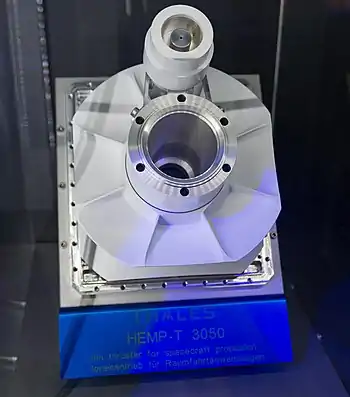HEMPT 3050
HEMPT 3050 is a satellite station-keeping Ion thruster, currently selected for the use on German Heinrich Hertz satellite. It's designed to be used for two roles: orbit-rising and station-keeping. To date it's been demonstrated to operate over 9000 hours.[1]
 | |
| Country of origin | Germany |
|---|---|
| Manufacturer | Thales Elektronic Systems GmbH |
| Application | Satellite Station Keeping |
| Status | In development |
| Hall-effect thruster | |
| Performance | |
| Thrust | 50 mN |
| Specific impulse | 3620 s |
| Used in | |
| Heinrich Hertz | |
Thruster was originally planned to be used on the Hispasat AG1, based on SmallGEO bus, however it was switched to the Heinrich Hertz, which is based on the same platform. Thruster design has been in development since 2002, and thanks to unique magnetic confinement it features both: high efficiency and negligible erosion, what contributes to a long lifetime.[2]
Specifications
| Parameter | Value | |
|---|---|---|
| Exhaust velocity (m/s) | 28000 | |
| Thrust (mN) | 44 | |
| Thrust-to-power level (mN/kW) | 32.59 | |
| Specific impulse (s) | 2500 | |
| Power (W) | 1350 | |
| Thruster mass (kg) | 6.8 | |
| Control unit mass (kg) | 13 | |
| Reference: [3] | ||
References
- "HEMPT-NG development to provide European competitive EP system for future space missions" (PDF). ESA. 24 October 2017. Retrieved 23 February 2019.
- Overview, Qualification and Delivery Status of the HEMP-Thruster based Ion Propulsion System for SmallGEO (PDF). International Electric Propulsion Conference. October 2017. Retrieved 23 February 2019.
- "HEMPT 3050 Propulseur ionique" (PDF) (in French). Thales Group. Retrieved 23 February 2019.
This article is issued from Wikipedia. The text is licensed under Creative Commons - Attribution - Sharealike. Additional terms may apply for the media files.